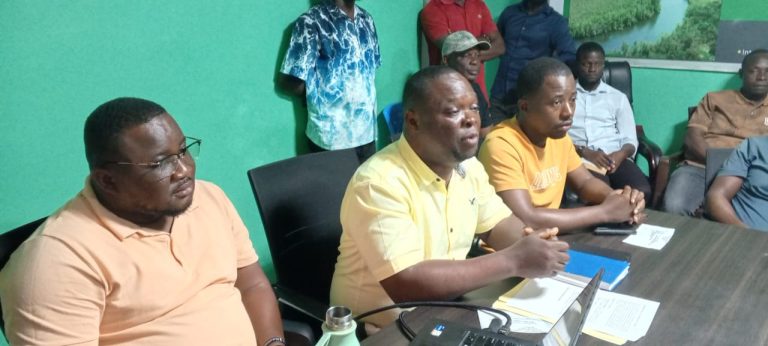Posts Categories
Latest Posts

Monrovia, Liberia – August 29, 2025 – The Environmental Protection Agency (EPA) of Liberia continued its commitment to internal environmental education today with its latest installment of the “Know Your Environment” program—this time sounding the alarm on the growing threat of noise pollution.
Held at the conference room of the Department of Compliance and Enforcement at the EPA headquarters, the recurring educational initiative brought together employees and senior staff to explore the serious environmental and health impacts of excessive noise. The event aimed to strengthen institutional knowledge and encourage EPA workers to become stewards of environmental awareness in their communities.
In his opening remarks, Christopher Kabah, Director of Planning and Policy at the EPA, welcomed staff and highlighted noise pollution as the focal point of this edition. “Noise pollution is no longer a minor nuisance,” Kabah emphasized, “it’s a serious environmental issue with long-term consequences.”
Acting Deputy Executive Director (DED) of the EPA, Anthony Kollie, urged staff to take full advantage of the program, describing it as a unique opportunity to build both personal and professional capacity. “This initiative does more than just inform,” Kollie said. “It empowers. It helps citizens understand environmental policies, promotes compliance, and fosters environmental stewardship.”
Kollie also expressed admiration for Rafael Ngumbu, Director of Environmental Research and Radiation Standards (ERRS), who served as the keynote presenter. “Ngumbu is one of our most respected environmental professionals,” he noted, praising his dedication and technical expertise.
Taking the stage, Ngumbu thanked agency leadership and attendees for their presence, before diving into the crux of the presentation—noise pollution, a subject he described as both urgent and underestimated.
Referencing a professional visit to Sierra Leone, Ngumbu recounted being impressed by the environmental awareness exhibited by even the janitorial staff and drivers of Sierra Leone’s environmental agency. “We need that level of integration and awareness here in Liberia,” he urged.
Ngumbu also referenced recent public discussions led by Dr. Emmanuel K. Urey Yarkpawolo, noting the increasing public concern around noise levels in urban and rural communities. “Noise is not just loud sound,” Ngumbu explained. “It is any sound that adversely impacts human health or the natural environment.”
Citing alarming figures from the World Health Organization (WHO), Ngumbu warned that 1.1 billion people globally are at risk of hearing loss due to prolonged exposure to excessive noise. He added that noise pollution contributes to approximately 2.2 million health-related cases each year. “This is why the EPA is actively enforcing Liberia’s 2017 regulations on noise pollution,” he affirmed.
Common sources of noise pollution, Ngumbu noted, include transportation systems, industrial operations, entertainment centers, power generators, religious gatherings, and bustling marketplaces. “The longer someone is exposed to high decibel sound, the greater the risk to their hearing and overall health,” he said, noting that around 5% of the global population already suffers from hearing impairment.
Ngumbu concluded with a call to action: “EPA employees must be the ambassadors of noise control. If we don’t lead by example, how can we expect others to follow?”
As Liberia grapples with rapid urbanization and growing industrial activity, today’s session served as a timely reminder that protecting the environment starts from within—and that silence, too, can be golden.
